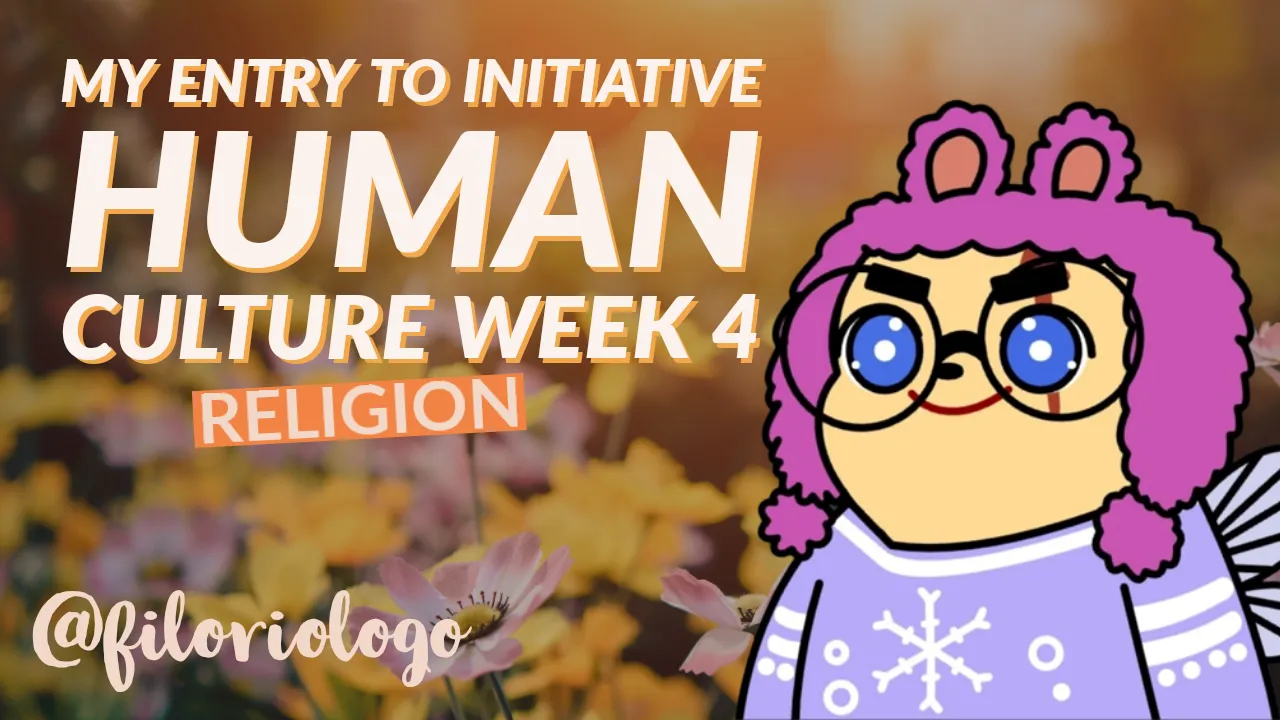
I want to begin this reflection starting from the premise that we once debated in classes of philosophical anthropology, so rhetorically stated that only a rational being can be given religiosity, only homo sapiens stands as homo-religiosus. So, starting from the premise that the human being is a homo-religiosus, we must conceive the religious dimension as an essential constitution of the human being.
Although this reflection invites us to think about the religious phenomenon, in my case I cannot separate it from an anthropological vision, throughout human history the religious has manifested itself in different ways, which we could conceive as the different religions or religious practices in the different cultures that have existed for thousands of years. This makes me think of the religious phenomenon as a need or tendency towards the ontological, trying to establish a connection with "God", making religion the expression of a people around spirituality.
An attempt to delve deeper into the religious phenomenon, an exhaustive exercise of anthropological readings and dialogues inside and outside the classroom, made it possible for us to outline three levels of the religious phenomenon. The first level is nothing more than the ontological dimension of religion itself; the second level has to do with the modes of religious expression in different cultures; and a third level has to do with the personal, that is, the experiences lived in a concrete way by each person. I consider that each of these levels make up the religious phenomenon in its totality.
Now, it is undeniable the close relationship of the religiosity of a people with its history and development, although with this I do not affirm that the development of a people is exclusive of its ontological nexus, but, until today, much is said about the religious phenomenon of a people with its history, and this point seems to me something extremely important, because in the last decades a countless number of religious practices have emerged along with globalization, and this makes me think that the human being seems inseparable from his religious condition. It seems that history is shaping not only the social but also the way of being religious.
I consider that the religious is nothing more than the search for an ulterior meaning, a search for ontological meaning, and that from this meaning, we can do many things for or against humanity itself. In the name of God, much harm has been done and much blood has been shed, but also in his name the most beneficial acts of love and charity have been done.
The human being is a finite infinite, an indeterminate indeterminacy, so either God created us in his image and likeness or we created him in our image and likeness. By this I mean, whatever we create, there is always an inaccessible aspect by the simple fact of our limited human condition. I believe that these issues become controversial because of trifles, because affirming certainty in some ontological argument is a bit uphill, and not because of this I affirmed the validity of relativity. I do not like to fall into arguments or discussions that start from a relativistic point. Certainly we cannot do science in the religious-ontological realm, but neither can we say that everything has the same weight, it would be like affirming that all opinions are equally valid, but on this point of opinions is a matter that is beside the point.
Personally I must say that every time I think about the religious phenomenon, I do it in an anthropological sense because they seem to me inseparable aspects, now then, I would like to end this reflection with a quote from the philosopher Xavier Zubiri, who devoted much to these religious reflections.
"The human being is not that he has an experience of God, it is that the human being is an experience of God."
Xavier Zubiri, Man and God, o.c., 325; cf. Id., Nature. Historia. God (Editorial Nacional, Madrid 1981)
Thank you for your time in reading this post!

VERSIÓN EN ESPAÑOL
Mi entrada a la Iniciativa: Cultura Humana Semana 4: Religión
Quiero comenzar esta reflexión partiendo de la premisa que alguna vez debatimos en clases de antropología filosófica, así que de manera retórica afirmó que solo un ser racional se puede dar la religiosidad, solo el homo sapiens se erige como homo-religiosus. Así que partiendo de la premisa que el ser humano es un homo-religiosus debemos concebir a la dimensión religiosa como una constitución esencial al ser humano.
Aunque esta reflexión nos invita a pensar el fenómeno religioso, en mi caso no lo puedo separar de una visión antropológica, a lo largo de la historia humana lo religioso se ha manifestado de diversas modos, lo que podríamos concebir como las distintas religiones o prácticas religiosas en las diferentes culturas que han habido desde hace miles de años. Cosa que me hace pensar al fenómeno religioso como una necesidad o tendencia hacia lo ontológico,intentando establecer una conexión con “Dios”, haciendo que la religión sea la expresión de un pueblo en torno a la espiritualidad.
Un intento de profundizar en el fenómeno religioso, un ejercicio exhaustivo de lecturas antropológicas y diálogos dentro y fuera de aulas, hizo que pudiésemos esbozar tres niveles del fenómeno religioso. El primer nivel, no es más que la dimensión ontológica en sí de la religión; el segundo nivel, tiene que ver con los modos de expresión religiosa en las diferentes culturas; y un tercer nivel tiene que ver con lo personal, es decir la experiencias vividas de manera concreta por cada persona. Considero que cada uno de estos niveles conforman en su totalidad el fenómeno religioso.
Ahora bien, es innegable la estrecha relación de la religiosidad de un pueblo con su historia y desarrollo, aunque con esto no afirmo que el desarrollo de un pueblo es exclusivo de su nexo ontológico, pero, hasta hoy, mucho da de hablar el fenómeno religioso de un pueblo con su historia, y este punto me parece algo sumamente importante, porque en las últimas décadas ha surgido junto con la globalización un incontable número de prácticas religiosas, y esto me hace pensar que parece inseparable el ser humano de su condición religiosa. Parece que la historia va moldeando no solo lo social sino también el modo de darse lo religioso.
Considero que lo religioso no es otra cosa que la búsqueda de un sentido ulterior, una búsqueda de significado ontológico, y que a partir de dicho sentido, podemos hacer muchas cosas en pro o contra la humanidad misma. En nombre de Dios, se ha hecho mucho daño y se ha derramado mucha sangre, pero también en su nombre se han hecho lo más benéficos actos de amor y caridad.
El ser humano es un infinito finito, una indeterminación indeterminada, así que o Dios nos creó a su imagen y semejanza o nosotros le creamos a nuestra imagen y semejanza. Con esto quiero decir, que sea lo que sea que creamos, siempre hay un aspecto inaccesible por el simple hecho de nuestra condición humana limitada. Creo que estos temas llegan a ser polémicos por nimiedades, porque afirmar seguridad en algún argumento ontológico es un poco cuesta arriba, y no por esto afirmó la validez de la relatividad. No me gusta caer en argumentos o discusiones que parten de un punto relativista. Ciertamente no podemos hacer ciencia en el ámbito religioso-ontológico, pero tampoco decir que todo tiene el mismo peso, sería como afirmar que todas las opiniones son igual de válidas, pero en este punto de las opiniones es un asunto que no viene al caso.
Personalmente debo decir que cada vez que pienso en el fenómeno religioso, lo hago en un sentido antropológico porque me parecen aspectos inseparables, ahora bien, me gustaría terminar esta reflexión con una cita del filósofo Xavier Zubiri, quien dedicó mucho a estas reflexiones religiosas.
“El ser humano no es que tenga una experiencia de Dios, es que el ser humano es experiencia de Dios”*
Xavier Zubiri, El hombre y Dios, o.c., 325; cf. Id., Naturaleza. Historia. Dios (Editorial Nacional, Madrid 1981)
Gracias por tu tiempo al leer este post!

